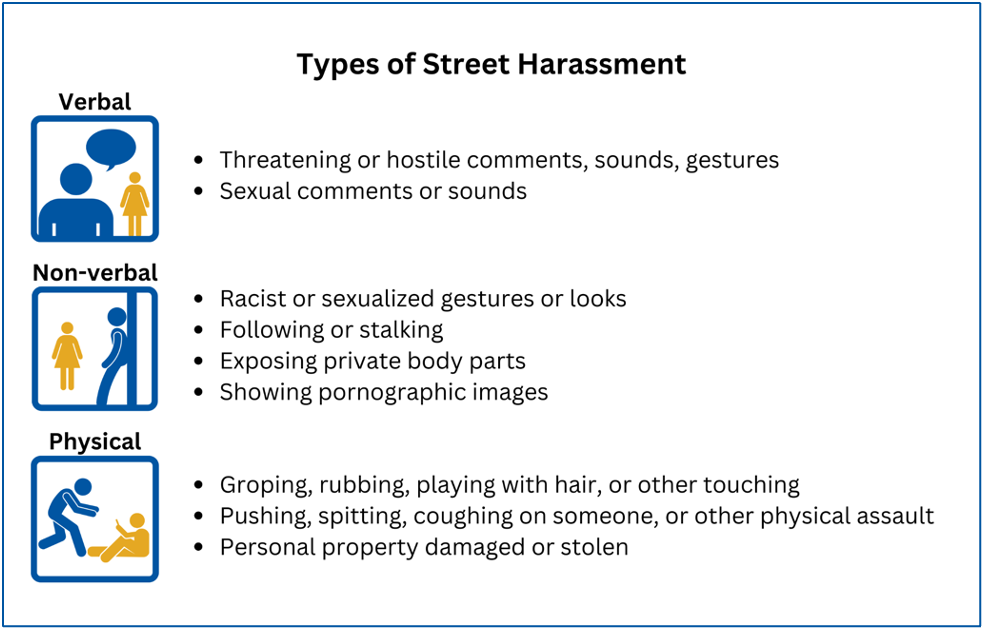- 408-924-7560
- mineta-institute@sjsu.edu
- Donate
Putting the Brakes on Street Harassment on Public Transit
Street harassment is a widely-recognized phenomenon on public transportation that unfortunately goes largely undocumented. Researchers from the Mineta Transportation Institute (MTI) developed a survey instrument that transit operators can use to collect information from passengers about the extent, location, and characteristics of any street harassment they have experienced.
Street harassment can be verbal, non-verbal, and/or physical. Examples include cat-calling, racist gestures, groping, and spitting. Harassers target victims based on a wide variety of personal characteristics such as perceived gender, race, disability, or sexual orientation. Fear of harassment leads many would-be transit riders to ride only at certain times of day or only when traveling with a companion—or even to stop riding transit altogether.
Although both male and female riders may suffer from harassment, the problem is more severe for women and girls, especially those who are low-income or of color. Evidence also suggests that nonbinary and transgender transit passengers experience disproportionate levels of sexual harassment.
Study author Asha Weinstein Agrawal, PhD, explains the need for the research: “Despite wide-spread acknowledgment that transit passenger harassment is a problem, most transit operators don’t know specifically who is targeted, what kinds of behaviors are common, the scale of the problem, or how victims respond.”
The MTI survey provides a rigorously-vetted research method transit operators can use to gather evidence about the extent of passenger harassment. Survey findings will allow transit operators to develop appropriate programs to combat the kinds of harassment happening on their systems.
The study was conducted in accordance with California Senate Bill 1161 (2022), legislation introduced by California State Senator Dave Min. More recent legislation from Senator Min, California Senate Bill 434 (2023), requires California’s ten largest transit operators to document passenger experiences with harassment using the MTI survey or an equivalent and report the findings by the end of 2024.
The survey instrument was produced in English, Spanish, and Chinese. It is also available in 11 AAPI languages thanks to support from Stop AAPI Hate.

Source: Design by Minvhy Tran, adapted from the RedDot Foundation SafeCity initiative and Vania Ceccato, “Sexual Violence in Public Transportation,” International Encyclopedia of Transportation (2019).
ABOUT THE MINETA TRANSPORTATION INSTITUTE
At the Mineta Transportation Institute (MTI) at San Jose State University (SJSU) our mission is to increase mobility for all by improving the safety, efficiency, accessibility, and convenience of our nations’ transportation system. Through research, education, workforce development and technology transfer, we help create a connected world. Founded in 1991, MTI is a university transportation center funded by the US Department of Transportation, the California Department of Transportation, and public and private grants, including those made available by the Road Repair and Accountability Act of 2017 (SB1). MTI is affiliated with SJSU’s Lucas College and Graduate School of Business.
ABOUT THE AUTHORS
Asha Weinstein Agrawal, PhD, is Director of the Mineta Transportation Institute’s National Transportation Finance Center. Jon Canapary is Owner/CEO of Corey, Canapary and Galanis. Carol Anne Carroll is Research Director at Corey, Canapary and Galanis. Tam J. Guy (they/them) is a doctoral candidate in Urban Planning at the Luskin School of Public Affairs at UCLA. Anastasia Loukaitou-Sideris, PhD, is Interim Dean of the Luskin School of Public Affairs at UCLA.
Media Contact:
-
Contact Us
San José State University One Washington Square, San Jose, CA 95192 Phone: 408-924-7560 Email: mineta-institute@sjsu.edu





